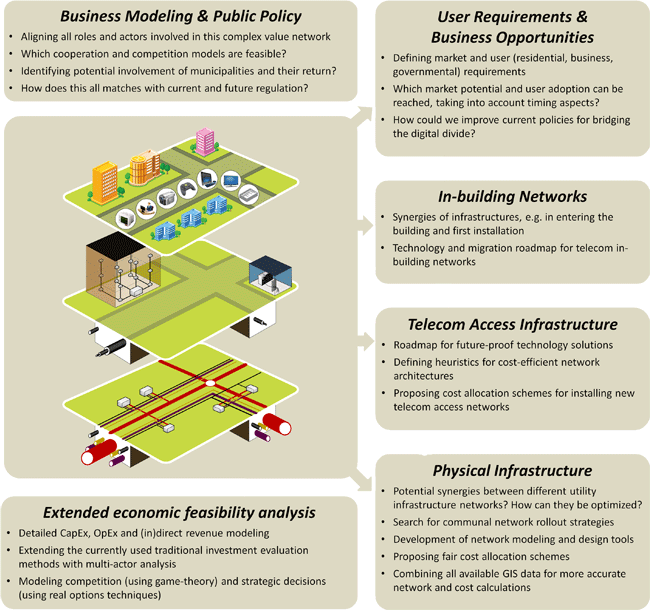Project overview
Telecommunication networks should be seen as the next utility network (comparable to electricity, water or gas) due to the large similarities in rollout and operational management of all these networks but also as a necessary condition in enabling every person who so wishes to participate fully in the information society, despite individual or social disadvantages.
For telecom operators, migrating to an all fibre access network, which would open up huge bandwidths to the customers, is one bridge to far. Clearly this is caused by the fact that the replacement of the telecom access network infrastructure is a very costly project, certainly when infrastructure competition is fierce and dedicated networks must be deployed. Additionally new investments in utility networks mostly imply large civil works which disrupt traffic and cause frustration for inhabitants and local retailers. The rollout and upgrade of these networks are mostly not synchronised, nor are the continuous operations in a later stage such as repair and maintenance processes. When the different utility network owners of roads, sewerage, drinking water, gas, electricity and telecom can be pursued to close cooperation, large synergies and considerable savings could be obtained. Especially when telecom operators or municipalities would make a long-term planning for future telecom (open) access networks, and could combine their rollouts with other utility networks, a faster and more cost efficient rollout could be guaranteed (economies of scale and scope) which will benefit the whole society. Defining new cooperation models requires a thorough investigation of the current value networks including the roles and actors involved in every stage of the rollout and operational processes.
All aspects will be analysed from a techno-economic point of view, considering the whole picture: technical (topology, architectures), social (user perspective, welfare), economic (cost/benefit analysis, multi-actor, competition and strategic decision analysis) and regulatory (competition, open access) sub-problems are tackled. The results from the different studies within this project will be combined to formulate and evaluate some best practices and recommendations towards utility and telecom network operators, municipalities, as well as guidelines for future regulation, a technology migration roadmap for access and in-building networks, cooperation and competition models, and valorisation.

Overview presentation
This presentation gives a general overview of the TERRAIN project.
Additional information
| Project lead: | Jan Van Ooteghem (Ghent University / IBCN) |
| IBBT Program manager | Nico Verplancke |
| Type of project: | IBBT ICON |
| Start project: | October 2010 |
| Project duration: | 2 years |

